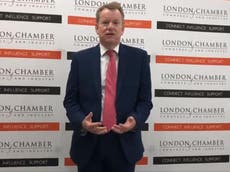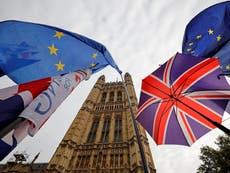After years of insisting otherwise, the government just revealed it actually wants no-deal Brexit
It seems as though we’re walking away from the deal before the talks have even started with the EU. If it imposes barriers on British goods and services, there will be incredibly hard times ahead

Well, at least we know. David Frost, the UK's de facto chief Brexit negotiator, made a very important speech in Brussels that stated, in terms, that the UK wants – actually desires – a no-deal Brexit. In contrast to his political masters, he could not have been clearer. In a thoughtful and rather candid speech he stated:
“In an age of huge change, being able to anticipate to adapt, and to encourage really counts. Brexit is about a medium-term belief in that reality that this is true – that even if there is a short-run cost, it will be overwhelmed rapidly by the huge gains of having your own policy regimes in certain areas.”
Note well that he admitted, maybe as far as he could go, that there would indeed be a “short-run cost” to Brexit. Unspecified, and minimised, but there is the magical word – “cost”. We have come a long way since Brexit wasn’t “done” last autumn.
Not so very long ago, a hard Brexit, the so-called “cliff-edge” version, the “no deal” scenario by which the UK would leave the EU with no agreement on future trade or security relations, was regarded with a certain degree of horror, even by many Brexiteers. During the Brexit referendum campaign, it was regarded, except by a few of the bad boys of Brexit, as an almost laughable proposition, part of “project fear”. They pointed to Switzerland, Norway and other countries that enjoyed close economic and trading ties with the EU, but were not required to be members. A new trade deal was supposed to be the easiest thing in history to achieve. We “held all the cards”, if you recall.
Last year it had moved a bit. There was a more sceptical tone about. Punted around by the various Tory leadership candidates – but only as a negotiating tactic – was the idea that the way to get a deal is to threaten “no deal”, and not rule it out, as Theresa May had, supposedly, foolishly done. We heard time and again, that in a negotiation about buying a house or a car or an electric kettle off eBay, you have to be prepared to walk away from a deal to get the best price.
Now we know better. No deal is pretty much the expected aim of HM government, the kind of Brexit, it could be fairly argued, that few wanted or expected back in 2016. There probably never was such a thing as a soft Brexit, because being a rule-taker, not a rule-maker, is pointless, and the only option left is to go your own way. It is not a negotiating tactic at all. Here is Mr Frost again:
“To think that we might accept EU supervision on so-called level playing field issues simply fails to see the point of what we are doing. That isn’t a simple negotiating position which might move under pressure – it is the point of the whole project. That’s also why we are not going to extend the transition period beyond the end of this year. At the end of this year, we would recover our political and economic independence in full – why would we want to postpone it? That is the point of Brexit.”
Well, it seems as though we’re walking away from the deal before the talks have even started with the EU. That should at least save some time. We may as well bring the deadline for the end of trade talks forward to tomorrow morning.
The British, or rather Frost, argue that they should be given the same sort of treatment that the Canadians were in their recent trade deal with the EU, the Comprehensive Economic and Trade Agreement, or CETA. Although there are some mutual obligations, there is nothing in the CETA remotely like the kind of “level playing field” demands the EU is demanding of the UK. Boris Johnson says it is not fair for Europe to treat Britain in a different manner. They are right; but trade talks, like all politics, are not necessarily about fairness, whatever that is. It is about the pursuit of national, or in this case, supranational interest. And, as ever, the UK has more to lose in these talks than the EU has. The EU is much the bigger entity – in population and economic strength – and the bigger participant in trade talks usually ends up with the best of any deal.
Moreover, the UK has already given up some of the strongest cards it had in the trade talks – the “divorce” settlement of about £39bn, the status of EU citizens in the UK and the Irish border question. Once upon a time, David Davis, as Brexit secretary reassured us that nothing woud be agreed until everything had been agreed – divorce agreement plus new trade and security deal. It didn’t work out like that.
All that said, the UK does still have some cards to play. There are pockets of the European economy that rely greatly on the UK – some of the car factories, the fishing ports, the tourist destinations. Some would certainly lose their livelihoods in the event of a no-deal Brexit, just as some British communities would. Brexit is going to be lose-lose whatever happens; yet there is some hope that the domestic political pressure in parts of Western Europe especially will push the politicians in the EU to soften their demands about the “level playing field”.
Maybe. If not, though, and the EU imposes tariffs and quotas and other barriers on British goods and services, then the UK will undergo a recession, and it may be a deep and protracted one. The 2020s will be, for those who remember the time, rather like the 1980s, when the country underwent another great economic experiment. There will be hard times. I look forward to Mr Frost’s next candid assessment of just how painful the “short-run cost” will prove to be.





Join our commenting forum
Join thought-provoking conversations, follow other Independent readers and see their replies